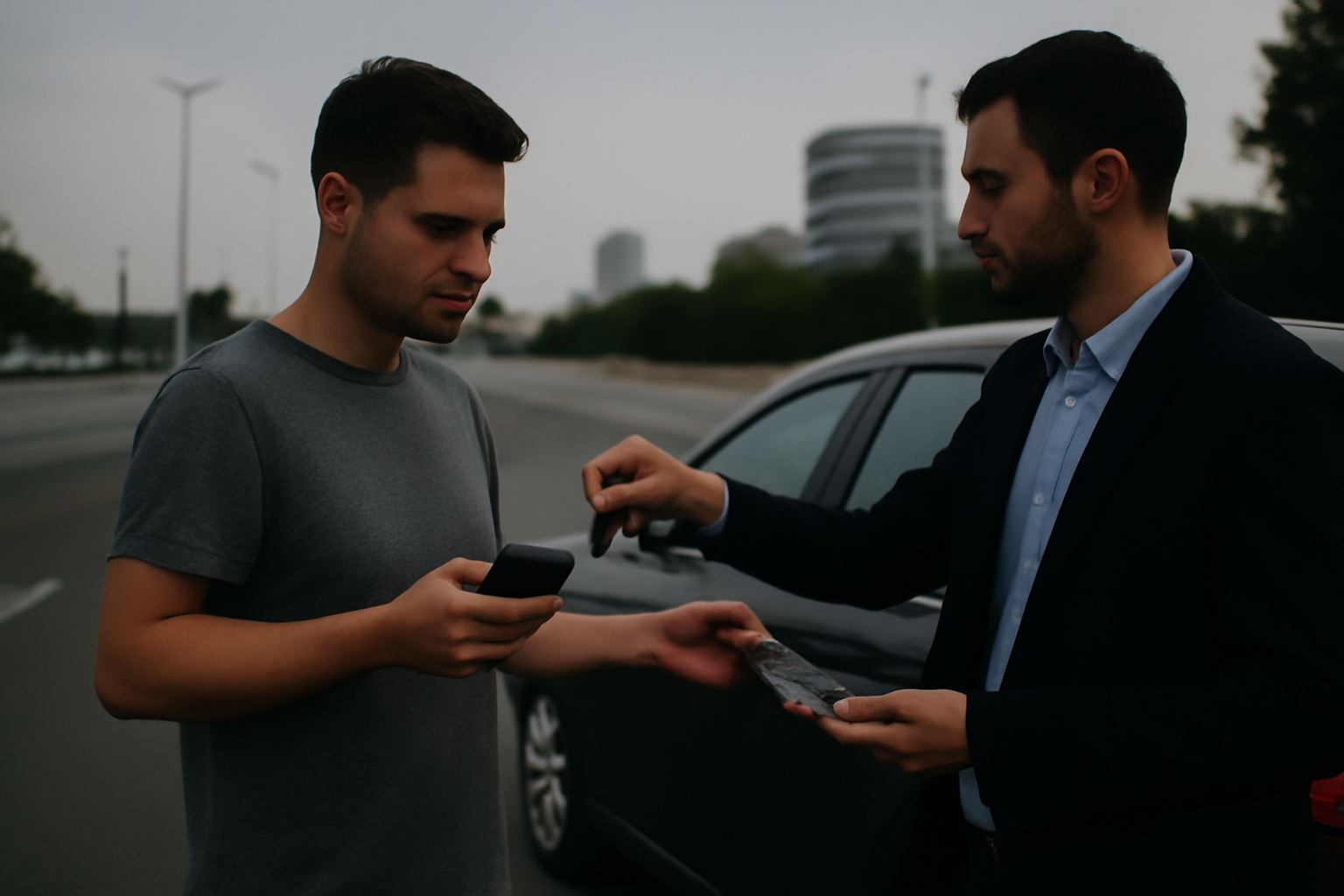

Procedure for Buying a Second-Hand Car in Abu Dhabi
Procedure for Buying a Second-Hand Car in Abu Dhabi
Buying a second-hand car in Abu Dhabi is a smart choice for many. The procedure can be simple if you understand the necessary steps and know where to look. Whether you’re searching for a budget-friendly option or a specific model, the process requires some attention to detail. This guide will walk you through the entire process, ensuring you make the best decision while also ensuring that you can sell your car when needed.
Understanding the Process of Buying a Second-Hand Car
Before diving into the process, it’s essential to know why buying a second-hand car in Abu Dhabi is so popular. Not only can you save a significant amount of money, but you also gain access to a wide variety of cars, from nearly new to older models that still have excellent life left in them.
The procedure for buying a second-hand car in Abu Dhabi is straightforward, but it requires some research and preparation. Here’s a step-by-step breakdown of what you need to do to ensure you make a good purchase.
1. Research the Car Market in Abu Dhabi
The first step in buying a second-hand car is researching the market. Car prices can vary depending on the make, model, year, and condition. Websites like iCarsU.com and other local platforms offer a vast selection of second-hand cars in Abu Dhabi. By browsing these listings, you’ll get an idea of the market price for the car you’re interested in.
While you research, make sure to note the following:
- Car Make and Model: Popular cars such as Toyota, Nissan, and Honda hold their value well in Abu Dhabi.
- Price Range: Prices for second-hand cars can differ greatly. Establishing your budget will help narrow down your options.
- Mileage: The fewer kilometers driven, the better the deal, but don’t disregard cars with higher mileage if they’ve been well-maintained.
2. Set Your Budget
Setting a budget is crucial when buying a second-hand car. Keep in mind that in addition to the purchase price, you’ll need to budget for insurance, registration fees, and possible repairs. In Abu Dhabi, the average cost of a second-hand car can range from AED 15,000 to AED 100,000, depending on the vehicle’s age and condition.
3. Inspect the Car Thoroughly
Once you’ve found a car you like, inspect it thoroughly. It’s best to check for both mechanical issues and the condition of the car’s exterior and interior. If you’re unsure of what to look for, you can take a trusted mechanic along to perform a more detailed inspection. Look for:
- Engine condition: Ensure there are no strange noises or leaks.
- Tires: Check for even tire wear and sufficient tread depth.
- Body Condition: Look for rust or any signs of previous accidents.
- Interior: Make sure the seats, air conditioning, and other features work properly.
An independent car inspection can save you from expensive repairs down the line. It is essential to ensure that the second-hand car you’re buying is free from hidden issues.
4. Verify the Vehicle’s History
Once you’ve inspected the car, you should verify its history. The UAE requires that second-hand cars have clear titles, meaning that the car should not be stolen or involved in any outstanding financial obligations. Ask the seller for the car’s history report, including:
- Previous Owners: A car with fewer owners is generally a better option.
- Accident History: Ensure that the car hasn’t been in any significant accidents that could affect its safety.
- Service History: A well-maintained car with regular service records is a good sign.
There are online platforms where you can check the vehicle’s history for a small fee. This is an essential step in the procedure for buying a second-hand car in Abu Dhabi, as it ensures you’re not purchasing a vehicle with hidden issues.
5. Negotiate the Price
Once you are satisfied with the car’s condition and history, it’s time to negotiate the price. Don’t be afraid to offer less than the asking price, as there is usually some room for negotiation. Use the results of your inspection to highlight any flaws or issues that can justify a lower price.
In Abu Dhabi, it’s common to negotiate with private sellers, but when buying from a dealership, the price might be less flexible. However, dealerships often offer warranties or service packages that private sellers may not provide.
6. Complete the Paperwork
Once you and the seller agree on a price, the next step is to complete the necessary paperwork. The documents you’ll need to complete the purchase include:
- Emirates ID: Both the buyer and seller will need to present their Emirates IDs.
- Vehicle Registration: You’ll need the original vehicle registration to transfer the car’s ownership.
- Insurance: The car must be insured before it can be registered.
- Proof of Payment: Keep a receipt of the payment for your records.
In Abu Dhabi, the process of transferring ownership of the car can be done at the Vehicle Registration Centers. The buyer needs to present all the required documents to complete the transaction. Ensure all paperwork is in order to avoid future legal issues.
7. Transfer Ownership and Registration
After completing the paperwork, you will need to transfer the car’s ownership and register it in your name. The Abu Dhabi Department of Transport (DoT) handles all car registrations in the emirate. You can complete the process online or visit the nearest registration center.
During this process, you’ll also need to pay the registration fees and any fines if applicable. Once the registration is complete, you’ll receive new license plates and a registration card with your name as the official owner of the vehicle.
8. Final Steps: Test Drive
Before finalizing the purchase, always take the car for a test drive. This gives you the chance to assess its driving performance. Pay attention to how the car handles, accelerates, and brakes. It’s important that you feel comfortable behind the wheel before committing to the purchase.
9. Sell Your Old Car (Optional)
If you already own a car and are looking to upgrade, you may want to sell your current vehicle. The procedure for selling a car in Abu Dhabi is relatively simple, and platforms like iCarsU.com allow you to sell any car quickly and efficiently. Many dealerships also offer trade-in options, where they will buy your old car and reduce the price of the new one accordingly.
By using trusted platforms, you can get an immediate cash offer for your car. This makes the transition from your old vehicle to a second-hand car smoother and faster.
10. Finalize Your Purchase and Enjoy Your New Car
Once the paperwork is completed, the ownership is transferred, and your second-hand car is registered, it’s time to hit the road. With the right research and a well-executed procedure, buying a second-hand car in Abu Dhabi is a rewarding experience.
Ready to Buy Your Second-Hand Car?
Buying a second-hand car can be a straightforward process if you know what steps to take. By following this guide, you’ll ensure that you are getting the best deal possible. Remember to inspect the car thoroughly, verify its history, negotiate the price, and complete the necessary paperwork. Whether you’re buying your first car or upgrading, following the right procedure for buying a second-hand car will make the process much easier and more efficient.
What is the best way to price a second-hand car in Abu Dhabi?
When pricing a second-hand car in Abu Dhabi, consider factors such as the car’s make, model, year, mileage, and condition. Research similar cars in your area through platforms like iCarsU.com to compare prices. Also, take into account any repairs or modifications made to the car that could affect its value. For a more accurate price, consider getting the car appraised by a professional or using an online pricing tool.
How do I ensure the second-hand car I buy is free from any financial obligations?
To ensure that the second-hand car you’re buying in Abu Dhabi has no financial obligations, always ask for the car’s history report. This report will confirm that the car is not under any outstanding loan or lease agreements. You can also verify the car’s status through the UAE’s official database to confirm there are no fines or debts attached to the vehicle. This helps you avoid any future legal or financial issues.
Is it necessary to have a mechanic inspect the car before buying in Abu Dhabi?
While not legally required, it’s highly recommended to have a mechanic inspect a second-hand car before purchasing. A mechanic can check for hidden issues such as engine problems, suspension wear, or rust that might not be immediately visible. This step helps ensure you’re not purchasing a car with expensive repairs ahead. In Abu Dhabi, where hot weather can impact a car’s condition, a mechanic’s insight can be invaluable.
Can I sell my second-hand car in Abu Dhabi even if it has outstanding fines?
Yes, you can sell your second-hand car in Abu Dhabi even if it has outstanding fines, but the fines must be cleared before transferring the car’s ownership. When selling the car, the buyer will need to verify that the fines are paid and that the car is in good standing with the authorities. You can clear the fines at the Vehicle Registration Centers before proceeding with the sale.
What documents do I need to complete the sale of a second-hand car in Abu Dhabi?
To complete the sale of a second-hand car in Abu Dhabi, you’ll need several documents, including the original vehicle registration, your Emirates ID, proof of payment for the car, and a completed transfer of ownership form. If you are buying from a dealer, they may assist with the paperwork. Ensure that you also have a receipt of the transaction, especially if dealing with a private seller.
Sell any car cash todayWant to know to calculate the payments of any used car in UAE
Add a comment Cancel reply
Categories
- Abu Dhabi (2)
- Accidents (3)
- Car Registration (1)
- GCC Specs (3)
- Imported (3)
- Sell a car (1)
- Specs (1)
- Uncategorized (11,190)
Recent Posts
Related posts


How to Sell a Car in Al Zaab Easily












